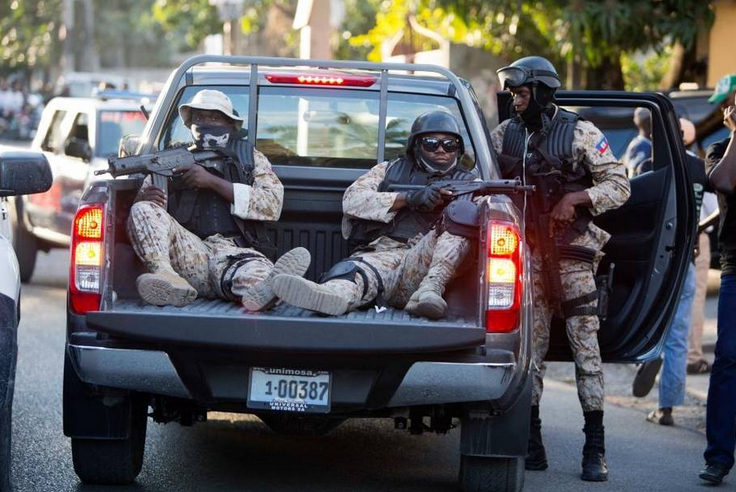By Jacqueline Charles
jcharles@miamiherald.com
Haiti’s parliament returned to work Monday with a brand new problem: two newly elected senators who can’t take office because one has been charged with a crime and the other was allegedly convicted 35 years ago.
“Two senators were elected from the Grand’ Anse, and I am the only one who is here,” newly sworn-in Sen. Sorel Jacinthe told the chamber.
He was referring to Senator-elect Guy Philippe, a notorious ex-rebel leader who was arrested Thursday by Haiti’s anti-drug trafficking police and flown to Miami by federal agents later that night. He has been charged with drug trafficking after eluding police for more than a decade.
“I deplore what has happened,” Jacinthe said.
Philippe’s arrest sparked angry outbursts and accusations of a U.S.-orchestrated “kidnapping” during Monday’s gathering of the National Assembly. His absence poses a dilemma for Haiti’s 30-member Senate, which must figure out what to do about his empty seat.
At the same time, the Senate also is waiting for the Provisional Electoral Council to decide on the fate of another senator-elect. Wilfrid Gelin has been accused of changing his name from Wilfred to Wilfrid in order to hide his guilty plea in 1982 for trying to smuggle undocumented individuals into the United States.
“This is unprecedented,” Senate President Ronald Lareche said told the Miami Herald about Philippe’s case. “There is no guidance for someone who has been arrested on drug charges, only if they were to die.”
He said Haiti’s elections body, the Provisional Electoral Council, would have to tell the Senate what the legal options are: “We don’t know yet what to do.”
Lemoine Bonneau, a journalist who has published a book on the Haitian parliament, said the law already offers some guidance. After establishing that Philippe has failed to show up in chambers, the Senate can request a new election to replace him and finish his six-year term, Bonneau said.
A member of the electoral council said it’s too early to decide what should happen to Philippe’s seat. The former cop faces up to life in prison in the United States on charges of cocaine trafficking and money laundering. He was ordered held without bond last week during an appearance in U.S. federal court in Miami. His arraignment is scheduled for Friday.
In the case of the other missing senator, what happens next is a lot foggier.
In late December, elections officials referred Gelin’s case to a commission to look into allegations that the newly elected senator had been sentenced to 90 days in U.S. federal prison and three years of probation.
Gelin’s detractors have circulated court records showing the 1982 conviction for a Wilfred Gelin, and a Florida driver’s license bearing the Haitian politician’s likeness. The license is registered to a Wilfred Gelin, of Pembroke Pines, and a driving history shows him to be a U.S. citizen. If Gelin is indeed a U.S. citizen, that alone would disqualify him to hold public office in Haiti, which does not recognize dual nationality. Haiti’s electoral law also prevents individuals convicted of a crime to run for office, though some argue that a U.S. conviction doesn’t apply.
Gelin has dismissed the allegations, and supporters in the Central Plateau, who voted for him to represent the region, have protested the elections-body decision.
As lawmakers from both chambers gathered Monday, however, the question on the parliament floor wasn’t what to do about Philippe’s or Gelin’s seats. Instead, the focus was on Philippe’s arrest, and how it was possible for a Haitian citizen to “to be deported to the United States.”
One deputy in the 119-member Lower Chamber even likened Philippe’s arrest to the famous anti-Nazi poem by Pastor Martin Niemöller, “First They Came for the Socialists.” Others tried unsuccessfully to delay the opening of parliament by requesting a closed-door meeting to discuss Philippe’s arrest.
They said that Interim President Jocelerme Privert and Prime Minister Enex Jean-Charles owed them an explanation.
“We were not well-informed on what happened,” newly-elected Sen. Joseph Lambert said. “Let’s do it here.”
Not everyone, however, agreed that Monday’s session was the proper venue to discuss Philippe’s arrest and its implications.
“I condemn what happened to Sen. Guy Philippe,” said Deputy Sinal Bertrand, a member of former President Jean-Bertrand Aristide’s Fanmi Lavalas party. “But it’s not the first time it has happened. It has happened to a Lavalas senator before and you parliamentarians had sufficient time to ensure that this wouldn’t happen again.”
Privert and Jean-Charles did not address Philippe’s arrest in their separate addresses. Instead, each reminded lawmakers that political stability is important as the nation moves forward after a drawn-out presidential election.
Eight senators still must be elected in a runoff on Jan. 29, when there will also be balloting for thousands of local seats.
Haiti faces huge economic challenges, such as dwindling foreign aid and a depreciating local currency. It is also still reeling from the effects of Hurricane Matthew, which created $2.8 billion in damage when it made landfall on the southern peninsula on Oct. 4.
“We need to start looking at country, and not personal interests,” Lareche, the Senate president, said. “We have a new government, a new president.”
Last week, Haiti’s Provisional Electoral Council confirmed businessman Jovenel Moïse as the country’s 58th president. Rivals Jude Célestin, Jean-Charles Moïse, and Moise Jean-Charles, however, are refusing to recognize the results.
In an address to the nation, Moïse thanked supporters and pledged “to work with all Haitians, hand-in-hand, to put the country on the road of order, discipline, and progress.”
